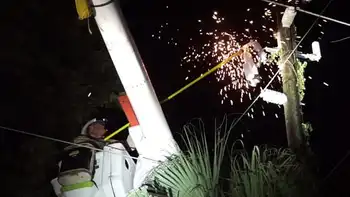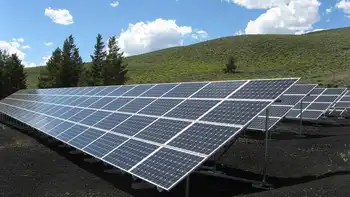Oak Ridge could take lead in new TVA nuclear design, but critics question secrecy, need
By Chattanooga Times/Free Press
NFPA 70e Training
Our customized live online or in‑person group training can be delivered to your staff at your location.

- Live Online
- 6 hours Instructor-led
- Group Training Available
Next month, TVA plans to ask regulators for permission to locate up to a dozen small modular reactors at the Clinch River site. Backers of the new reactor design say the smaller size make them cheaper, safer and more flexible than current nuclear plant designs.
But none of the four major nuclear manufacturers developing small modular reactors have gained certification for their models and TVA doesn't plan to bring on any of the new smaller units for at least another decade, even assuming they meet outstanding environmental and economic requirements.
But on Tuesday, the Nuclear Regulatory Commission staff will outline the process regulators will use to decide over the next three years whether the NRC should issue an early site permit for the 1,200-acre property on the Clinch River next to the Department of Energy's Oak Ridge facilities. In 1983 , TVA abandoned the breeder reactor being built on the site after concerns were voiced about the plant's costs and potential contribution to nuclear proliferation because of the plutonium produced by that design.
Small modular reactors, in contrast, can be built in a more scalable manner. Because of their smaller size, they also can use passive safety systems and be built underground to limit the dangers of radioactive leaks. The modular design could allow parts of the plant to be made in a factory to ensure consistent design and cheaper costs.
TVA is in a joint pilot project with the U.S. Department of Energy to help test the new technology.
Dan Stout, senior manager of SMR technology at TVA, said working with DOE to test the new power plant "is part of TVA's mission," although he said any final decision will require that the power source is also cost effective.
"We're focused on providing an option that provides reliable, affordable and carbon-free energy, and so we want to pursue this early site permit to give us the option for possibly locating SMRs on the site for 10 to 20 years," Stout said.
Similar early site permits were granted in Georgia, South Carolina and Virginia, among other sites, in advance of the eventual combined operating licenses being granted for other types of new nuclear plants.
Public hearings at planned at 2 p.m. and 6 p.m. next Tuesday at the Pollard Technology Center in Oak Ridge. Earlier in the day at 9 a.m., NRC officials also will meet with local elected officials to describe the review process in a closed door meeting with government leaders. An anti-nuclear activist on Friday appealed to TVA's inspector general to investigate the private meeting with the elected officials.
"Why a secret meeting prior to the regularly scheduled meeting?" asked Garry Morgan, a Scottsboro, Ala., activist in the anti-nuclear group, Bellefonte Efficiency and Sustainability Team BEST. "Could it be there are site problems or other problems which the DOE, NRC, TVA does not want the public to know about?"
Morgan charged that the meeting violates Tennessee's Sunshine Act, but NRC officials said such informational meetings are done as a courtesy to local officials and no deliberation by the NRC or anyone else occurs at such sessions. The local officials will not make any decision related to the proposed small modular reactors.
NRC spokesman Scott Burnell said regulators will conduct an environmental impact study for the proposed project and site, which will require extensive public scoping, hearings and comments before a decision is made, probably not until 2019.
TVA began working five years ago with Babcock and Wilcox to develop and test its small modular reactor design, known as mPower. But B&W backed away from its original schedule last year when it was unable to secure enough early utility interest in buying the new design.
Other than B&W, other small modular reactor designs are being developed by U.S. manufacturers Bechtel, NuScale Power LLC and Westinghouse. None of the new designs have been certified yet by the NRC.
But in a budget hearing earlier this week before a Senate subcommittee, NRC officials said they expects to receive and begin review of one small modular reactor design certification application from Fluor Corp. subsidiary NuScale Power LLC.
TVA has an inter-agency agreement to study SMR technology with the Department of Energy, which is paying half of the costs of the site and permit application for TVA.
Stout said the site being considered near Oak Ridge has been studied for any potential seismic and geological problems for decades, and TVA already has a rich library of information about the river and the area from the 1960s when the breeder reactor project was designed. "It's a very good site for its river and transmission access and it is located immediately adjacent to DOE, our partner in this project," Stout said.
TVA is proposing to build any small modular reactors on 935 of the 1,200 acres and projects it could develop up to 800 megawatts of power generating capacity from the reactors.
U.S. Sen. Lamar Alexander, chairman of the Senate appropriations subcommittee on energy and water, backs the study and ultimate development of small modular reactors.
"I'm glad to see TVA exploring small modular reactors," Alexander said. "TVA is a federal corporation with a unique mission, and it's appropriate that it would be one of the first utilities to explore whether it makes sense to use a smaller reactor that may cost much less and provide cheap, reliable, clean electricity."











